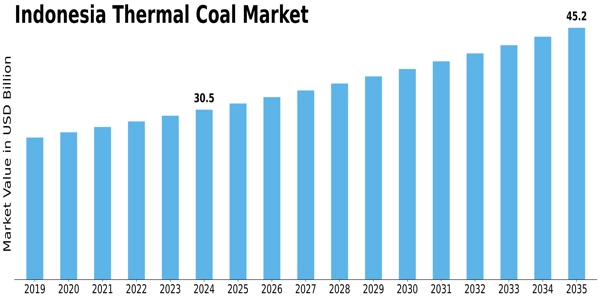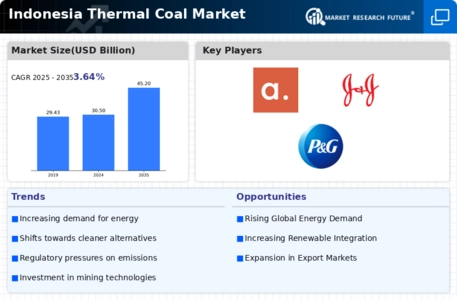Indonesia Thermal Coal Size
Indonesia Thermal Coal Market Growth Projections and Opportunities
Many market factors shape the Indonesia thermal coal market. Energy demand, both domestic and international, drives it. Indonesia's thermal coal is a key power source worldwide. The thermal coal market must meet rising electricity demand due to the country's growing population and industrial sector.
Global market developments and economic factors also influence Indonesia's thermal coal market. Indonesia is vulnerable to global demand and supply as a major thermal coal exporter. Indonesian thermal coal export quantities and pricing are affected by economic growth, geopolitics, and energy policies of key consumption countries. Thus, market participants actively monitor international developments to predict and respond to foreign changes.
Indonesia's thermal coal market depends on government policies and regulations. Coal producers are affected by government policies on environmental sustainability, mining licenses, and export quotas. The global focus on cleaner energy sources to prevent climate change has grown in recent years. This shift in environmental priority presents problems and opportunities for Indonesia's thermal coal sector. Government measures to promote sustainability and reduce carbon emissions may affect industrial production and market dynamics.
Infrastructure development also impacts Indonesia's thermal coal market. Well-established railways, ports, and highways are essential for coal transport and export. Infrastructure investments can boost thermal coal market competitiveness by lowering transportation costs and enhancing logistics. Conversely, infrastructure development issues might limit market expansion and efficiency.
Environmental and social concerns are growing in thermal coal markets. As knowledge of climate change and environmental effect rises, investors, consumers, and regulators are evaluating coal's sustainability standards. This has pushed the coal industry to prioritize cleaner technologies, carbon capture, and environmental and social responsibility. Indonesian thermal coal companies are adapting to shifting demands to keep their social license and enter international markets.
Competition also affects Indonesia's thermal coal market. Domestic and foreign players create a competitive field where corporations compete to improve efficiency, cut costs, and innovate. To stay competitive in the thermal coal business, market participants actively monitor pricing trends, technological advances, and operational efficiencies.







Leave a Comment